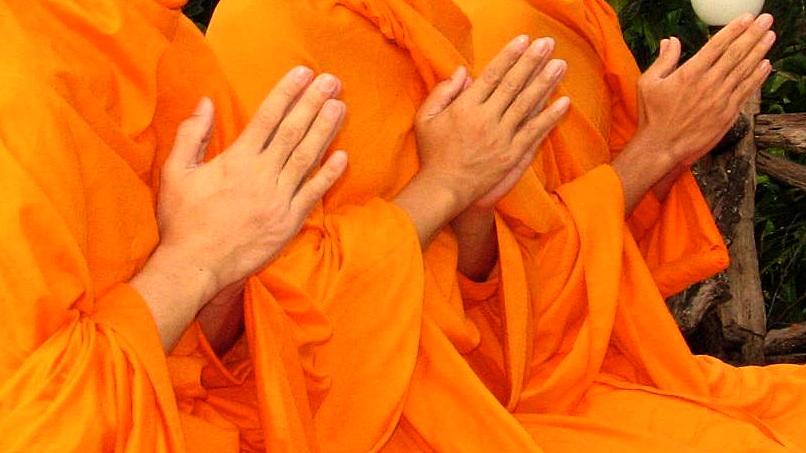“Mendicants, towards evening the lion, king of beasts, emerges from his den, yawns, looks all around the four quarters, and roars his lion’s roar three times. Then he sets out on the hunt. And the animals who hear the roar of the lion, king of beasts, are typically filled with fear, awe, and terror. They return to their lairs, be they in a hole, the water, or a wood; and the birds take to the air. Even the royal elephants, bound with strong harnesses in the villages, towns, and capital cities, break apart their bonds, and urinate and defecate in terror as they flee here and there. That’s how powerful is the lion, king of beasts, among animals, how illustrious and mighty.
In the same way, when a Realized One arises in the world—perfected, a fully awakened Buddha, accomplished in knowledge and conduct, holy, knower of the world, supreme guide for those who wish to train, teacher of gods and humans, awakened, blessed—he teaches the Dhamma: ‘Such is identity, such is the origin of identity, such is the cessation of identity, such is the practice that leads to the cessation of identity.’
Now, there are gods who are long-lived, beautiful, and very happy, lasting long in their divine palaces. When they hear this teaching by the Realized One, they’re typically filled with fear, awe, and terror. ‘Oh no! It turns out we’re impermanent, though we thought we were permanent! It turns out we don’t last, though we thought we were everlasting! It turns out we’re transient, though we thought we were eternal! It turns out that we’re impermanent, not lasting, transient, and included within identity.’
That’s how powerful is the Realized One in the world with its gods, how illustrious and mighty.
The Buddha, the teacher without a peer
in all the world with its gods,
rolls forth the Wheel of Dhamma
from his own insight:identity, its cessation,
the origin of identity,
and the noble eightfold path
that leads to the stilling of suffering.And then the long-lived gods,
so beautiful and famous,
are afraid and full of terror,
like the other beasts when they hear a lion.‘We haven’t transcended identity!
It turns out we’re impermanent!’
So they say when they hear the word
of the perfected one, free and poised.”
Read this translation of Aṅguttara Nikāya 4.33 Sīhasutta: The Lion Sīhasutta by Bhikkhu Sujato on SuttaCentral.net. Or read a different translation on SuttaCentral.net or DhammaTalks.org. Or listen on PaliAudio.com or SC-Voice.net. Or explore the Pali on DigitalPaliReader.online.
Or read a translation in Deutsch, বাংলা, Español, Bahasa Indonesia, 日本語, မြန်မာဘာသာ, Português, Русский, සිංහල, ไทย, Tiếng Việt, or 汉语. Learn how to find your language.


 Copyright: Creative Commons Zero (CC0) To the extent possible under law, Bhikkhu Sujato has waived all copyright and related or neighboring rights to his own translations on
Copyright: Creative Commons Zero (CC0) To the extent possible under law, Bhikkhu Sujato has waived all copyright and related or neighboring rights to his own translations on 


 Translations by Bhikkhu Ṭhanissaro are released under the Creative Commons Attribution-NonCommercial 4.0 Unported License. The author considers any sale, including by non-profit entities for non-profit purposes, to be ‘Commercial’ and a copyright violation. To view a copy of this license, visit the
Translations by Bhikkhu Ṭhanissaro are released under the Creative Commons Attribution-NonCommercial 4.0 Unported License. The author considers any sale, including by non-profit entities for non-profit purposes, to be ‘Commercial’ and a copyright violation. To view a copy of this license, visit the 

 All translations on this site by Bhikkhu Bodhi are licensed under a Creative Commons Attribution-NonCommercial-NoDerivs 3.0 Unported License.
Bhikkhu Bodhi, The Middle Length Discourses of the Buddha (Wisdom Publications, 2009), The Connected Discourses of the Buddha (Wisdom Publications, 2000), The Numerical Discourses of the Buddha (Wisdom Publications, 2012).
All translations on this site by Bhikkhu Bodhi are licensed under a Creative Commons Attribution-NonCommercial-NoDerivs 3.0 Unported License.
Bhikkhu Bodhi, The Middle Length Discourses of the Buddha (Wisdom Publications, 2009), The Connected Discourses of the Buddha (Wisdom Publications, 2000), The Numerical Discourses of the Buddha (Wisdom Publications, 2012).























